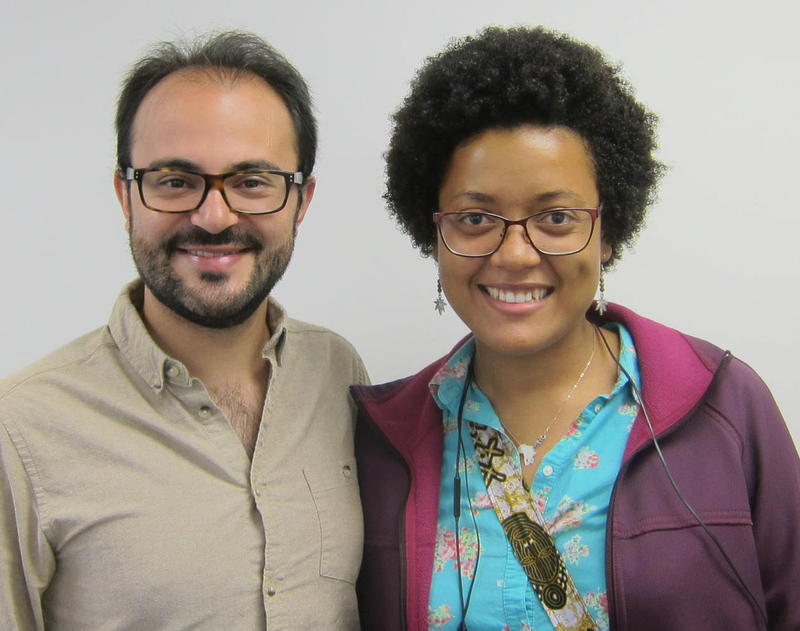Chase Cavanaugh, northernpublicradio.org
The Fulbright Program is an international exchange under the U.S. State Department's Bureau of Educational and Cultural Affairs. It allows foreign nationals to study at U.S. institutions and for Americans to do the same abroad.
Around six Fulbrights are studying at NIU [JB - see] this year, with two coming from this year's gateway program. The first is Felipe Valdez, an Ecuadoran who previously worked as a university teacher. In addition to pursuing a Ph.D. in Geography, Valdez said he aims to broaden his international circle.
“Everything is connected in geography, so I thought it was going to be a really good and rich experience for me,” he said.
The other student, Mirna Maria Fernandes, hails from Mozambique and is pursuing a degree in public administration. She was thrilled to meet fellow Africans at the Gateway. But most of all, she was grateful for being chosen to attend the program. Fernandes noted the Fulbright program is quite competitive back home.
“This year we were two girls selected. It’s amazing, women empowering," she said. "You get to know how lucky you are and how important it is to give value to the blessings that you receive.”
Both scholars still have fond memories of the gateway program and regularly chat with their fellow Fulbrights on WhatsApp. Fernandes says some of them plan to reunite over the holidays. For now, both students have begun their studies in earnest and, like many scholars abroad, are experiencing the differences in culture. For Fernandes, one of the earliest such moments was when one of her professors offered her a book on effective argumentation. She said it reflects a difference in pedagogy between the U.S. and Mozambique.
“Back in my country, I came to realize that we are taught not to form an argument, to have a discussion, but merely to tell a story. I found the U.S. program a bit challenging for me from what I’m used to back in my country; but at the same time, it’s an opportunity to take yourself to the next level.”
When dealing with Americans, Valdez said even daily greetings are a significant change.
"We give a kiss in the hand; we’re a very touchy people. Here people have always his own space...It doesn’t mean that they don’t want to be with you. It’s just that you have other ways of expressing your feelings, I don’t know,” he said.
This experience isn’t limited to Valdez, as Fernandes discovered during the Gateway trip to Chicago.
“Maybe in Chicago when you say, ‘Thank you,’ people don’t say, ‘You’re welcome.’ In Europe, some people say it, but normally in the big city, they say ‘Yup.’ Yup. I just said, ‘Thank you;’ can’t you say, ‘You’re welcome?’”
And then, of course, there’s the simple matter of the language barrier.
“I’m currently living with two American girls and had to tell them, please speak a bit slower, because I can’t understand what you’re saying," said Fernandes.
Portuguese is Fernandes’s native tongue (since Mozambique is a former Portugese colony), while Valdez speaks Spanish. Thus, regular conversation takes some adjustment.
But regardless of these various challenges, both Fulbright scholars are eager to excel in their studies and extend their connection with local Americans. Valdez admitted his perception of the U.S. has already evolved beyond stereotypes.
“People here in DeKalb and NIU, they’re very, very different from the image that I had from Americans," he said. "I have to say that it wasn’t a bad image, but it was different.”
From here, Valdez wants to dispel the same kind of stereotypes about Ecuador as this visit has done for his conceptions about Americans and, of course, get the chance to show off his country.
“To get the experience I have here, get it to there, so they can also know my country, know South America, know how they are, and learn to break these stereotypes we have from each other.”
Fernandes has similar ambitions, particularly when it comes to educating her roommates. But she also intends to expand her connections to the fullest.
“Now our daily life isn’t just about being a good professional or what you’re doing in your work," she said. "It’s about the human connection.”
Both Fulbright scholars will remain at NIU until they’ve completed their studies, although Valez's wife will join him in December. Afterwards, both they and Americans abroad will return to their home countries.
However, the future of Fulbright exchanges is in doubt. With the Trump administration (under Secretary of State Rex Tillerson) attempting to cut 47 percent of the State Department’s budget and the increasingly nativist sentiment in domestic politics, the particular visas that allow these exchanges are at risk of being curtailed.
Valdez and Fernandes hope this doesn’t happen, as they consider the experience an excellent form of cross-cultural exchange and public diplomacy. But only time will tell what happens in the near term.

No comments:
Post a Comment